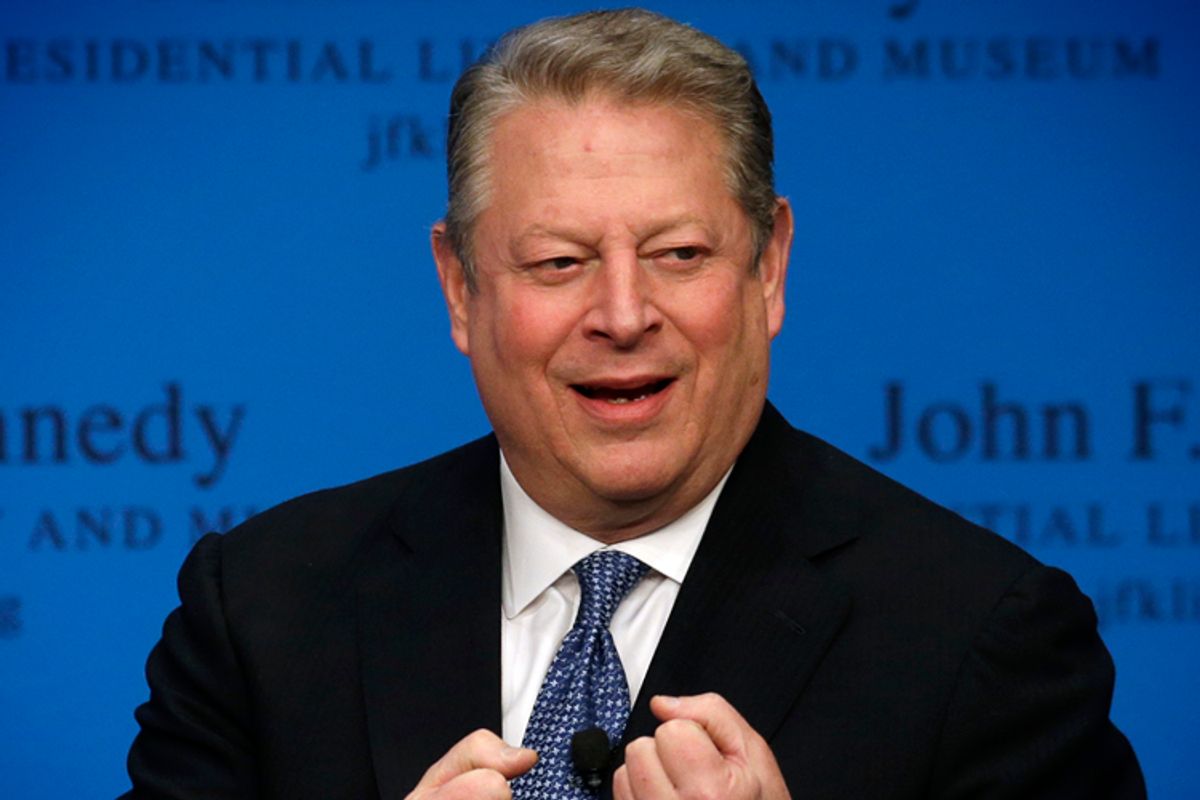Somewhere Al Gore is probably experiencing painful campaign flashbacks. Like if he heard NBC's Andrea Mitchell ask Hillary Clinton in a recent interview, "Does it hurt you when people say you are too lawyerly, you parse your words, you are not authentic, you're not connecting?"
Or when the Wall Street Journal published a piece suggesting so much of what Clinton does sounds "scripted and poll-tested." Or when Politico declared she's a White House hopeful "with an authenticity problem." Or when the Washington Post reported, "Her campaign has struggled to present her as authentic and relatable." Or when McClatchy Newspapers asked "Is Hillary Clinton Authentic Enough for Voters," and likened her to Richard Nixon.
"Authenticity" has clearly become the Beltway media's latest buzzword to describe what's supposedly wrongwith Clinton's campaign, even as she continues to have a sizeable national lead over her Democratic competitors.
The answer: She's a phony.
Why is this all likely ringing in Gore's ears? Because the last White House campaign that the Beltway press openly waged war against (the way it's now openly waging war on the Clinton campaign) was Gore's 2000 push. The Beltway elites hated Gore and didn't try to hide it, just like so many journalists seem to openly despise Clinton today. ("Reporters liked Bush and didn't like Gore," observed Paul Krugman at the New York Times.)
In 2000, Gore was widely ridiculed in the press as the wooden, over-calculating, poll-driven phony who was running against the epitome of true authenticity: George W. Bush. Sure, Gore knew his stuff cold and Bush seemed wobbly on the facts, and forget that Bush's entire campaign turned out to be built around the staged-crafted prevarication known as "compassionate conservativism." The press loved the Bush image and couldn't stand the Gore persona -- The New York Times mocked him as "Eddie Haskell," the neighborhood brownnoser from Leave It To Beaver.
The press dutifully spent the entire campaign regurgitating the Republicans' playbook on Gore: he's a phony who can't be trusted. Fast-forward and the Republican playbook reads the same on Clinton: She's a phony who can't be trusted. So yes, the media's current authenticity chatter plays right into the GOP's hands. It perfectly coincides with conservative talking points about how to undermine the Democratic frontrunner.
But the authenticity math doesn't seem to add up.
In 2008, Clinton tallied 18 million votes during the Democratic primary season. Obviously, she lost to Barack Obama but how did she win a whopping 18 million votes if, according to the press, she can't connect with people due to her utter lack of authenticity? (Reminder: Clinton won her 2000 New York Senate race in alandslide.)
The recent "authenticity" wave began with a New York Times article that claimed "there will be new efforts to bring spontaneity to a candidacy that sometimes seems wooden and overly cautious." The piece came complete with the mocking headline, "Hillary Clinton to Show More Humor and Heart, Aides Say." (Punch line: Clinton's handlers have to instruct her be warm and funny?)
Commentators immediately mocked the Clinton camp. "You don't project [authenticity] by having your campaign tell the world you're going to project authenticity," Bloomberg News' John Heilemann said on Face the Nation. The Washington Post's Dana Milbank ridiculed Clinton aides as "moron[s]" and fired off this insult: "And now comes the latest of many warm-and-fuzzy makeovers -- perhaps the most transparent phoniness since Al Gore discovered earth tones."
I couldn't have scripted that Gore reference better myself. Convinced Clinton is a phony who isn't comfortable in her own skin, Milbank reminded readers that Gore was such a supposed phony that he started wearing "earth tones," a reference to a manufactured kerfuffle from the 2000 campaign when the press claimed author Naomi Wolf counseled Gore on what color clothes he should wear. (Why? Because Gore doesn't know who he is!)
Turns out though, Wolf denied the claim as did Gore's aides. In fact there was never any proof to substantiate the charge, first floated as speculation in the Washington Post, about Gore and an earth tone wardrobe makeover. But that didn't matter because the press loved it and repeated the claim endlessly as proof of Gore's complete lack of foundation. (It ranked right up there with the made-up story about Gore claiming to have invented the Internet.)
Recap: During the 2000 campaign, the Post, citing speculation by Dick Morris, invented a tale about someone telling Gore to wear "earth tones," which supposedly proved what a phony he is. For the 2016 campaign, a Postcolumnist revived that false "earth tones" story and used it as a reference for how phony Clinton is.
So yes, the symmetry is perfect.
Now we're onto the Catch-22 phase of the "authenticity" blitz, in which commentators are sure any attempt by Clinton to show humor and heart is part of a calculated plan at authenticity.
In other words, after demanding that Clinton be more authentic, the press is now deducting points from Clinton for being more authentic. So really, there is no way for her to win. If Clinton's not spontaneous enough, the chattering class complains. If she is spontaneous or shows more of her private side, the chattering class dismisses it as orchestrated.
It's true that in 2012 Republican nominee Mitt Romney was hounded by allegations he wasn't being real enough. But much of that was driven by his clear pattern of flip-flopping on major issues, like the fact that as governor of Massachusetts he championed health care reform that looked a lot like Obamacare. Then he campaigned to abolish Obamacare. That eye rolling was amplified when Romney, the former center-right governor, suddenly declared himself to have been a "severely conservative" overseer in Massachusetts.
The media's authenticity police rarely ticket Clinton over substantive issues or for policy flip-flops. She's written up for personality infractions. Authenticity sometimes seems to be media shorthand for, 'We don't like you.'
Al Gore can relate.

Shares